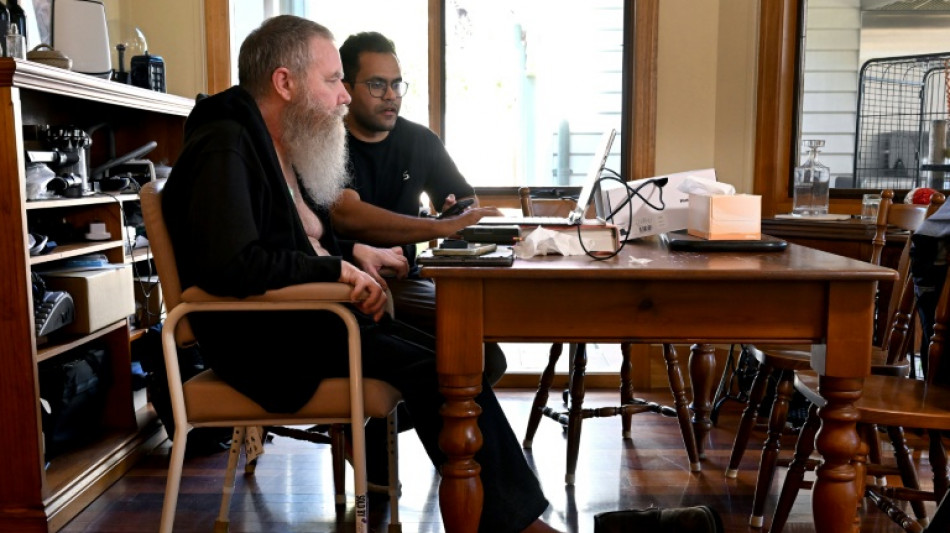
-
 Putin evokes WWII victory to rally Russia behind Ukraine offensive
Putin evokes WWII victory to rally Russia behind Ukraine offensive
-
China exports beat forecasts ahead of US tariff talks

-
 Leo XIV, the 'Latin Yankee', to celebrate first mass as pope
Leo XIV, the 'Latin Yankee', to celebrate first mass as pope
-
Most stocks lifted by hopes for US-China talks after UK deal

-
 IPL suspended indefinitely over India-Pakistan conflict: reports
IPL suspended indefinitely over India-Pakistan conflict: reports
-
German lender Commerzbank's profits jump as it fends off UniCredit

-
 Rare bone-eroding disease ruining lives in Kenya's poorest county
Rare bone-eroding disease ruining lives in Kenya's poorest county
-
India says repulsed fresh Pakistan attacks as de-escalation efforts grow

-
 Zhao's historic snooker title sparks talk of China world domination
Zhao's historic snooker title sparks talk of China world domination
-
'High expectations': EU looks to Merz for boost in tough times

-
 Poisoned guests rarely invited before deadly mushroom lunch, Australia trial hears
Poisoned guests rarely invited before deadly mushroom lunch, Australia trial hears
-
China sales to US slump even as exports beat forecasts

-
 Indian cricket to make 'final decision' on IPL over Pakistan conflict
Indian cricket to make 'final decision' on IPL over Pakistan conflict
-
Dethroned Bundesliga champions Leverkusen face uncertain future

-
 China can play hardball at looming trade talks with US: analysts
China can play hardball at looming trade talks with US: analysts
-
French monuments in trouble while PSG prepare for Champions League final

-
 Newcastle face Chelsea in top five showdown, Alexander-Arnold in spotlight
Newcastle face Chelsea in top five showdown, Alexander-Arnold in spotlight
-
Flick's Barca must show 'hunger' in crunch Liga Clasico

-
 Clasico the last chance saloon for Ancelotti's Real Madrid
Clasico the last chance saloon for Ancelotti's Real Madrid
-
Timberwolves overpower Warriors to level series

-
 Chinese fabric exporters anxious for US trade patch-up
Chinese fabric exporters anxious for US trade patch-up
-
Putin gears up to host world leaders at lavish army parade

-
 Nearing 100, Malaysian ex-PM Mahathir blasts 'old world' Trump
Nearing 100, Malaysian ex-PM Mahathir blasts 'old world' Trump
-
Leo XIV, first US pope, to celebrate first mass as pontiff

-
 Asian stocks lifted by hopes for US-China talks after UK deal
Asian stocks lifted by hopes for US-China talks after UK deal
-
Former head of crypto platform Celsius sentenced 12 years

-
 Ex-model testifies in NY court that Weinstein assaulted her at 16
Ex-model testifies in NY court that Weinstein assaulted her at 16
-
Genflow Biosciences PLC Announces Share Subscription, Director's Dealing and Update

-
 Argo Blockchain PLC Announces 2024 Annual Results and Restoration of Listing
Argo Blockchain PLC Announces 2024 Annual Results and Restoration of Listing
-
'Great honor': world leaders welcome first US pope

-
 Pacquiao to un-retire and fight Barrios for welterweight title: report
Pacquiao to un-retire and fight Barrios for welterweight title: report
-
Trump unveils UK trade deal, first since tariff blitz

-
 Man Utd one step away from Europa League glory despite horror season
Man Utd one step away from Europa League glory despite horror season
-
Jeeno shines on greens to grab LPGA lead at Liberty National

-
 Mitchell fires PGA career-low 61 to grab Truist lead
Mitchell fires PGA career-low 61 to grab Truist lead
-
AI tool uses selfies to predict biological age and cancer survival

-
 Extremely online new pope unafraid to talk politics
Extremely online new pope unafraid to talk politics
-
Postecoglou hits back as Spurs reach Europa League final

-
 Chelsea ease into Conference League final against Betis
Chelsea ease into Conference League final against Betis
-
Pope Leo XIV: Soft-spoken American spent decades amid poor in Peru

-
 First US pope shared articles critical of Trump, Vance
First US pope shared articles critical of Trump, Vance
-
'Inexcusable' - NBA champs Boston in trouble after letting big leads slip

-
 US automakers blast Trump's UK trade deal
US automakers blast Trump's UK trade deal
-
Stocks mostly rise as US-UK unveil trade deal

-
 Trump presses Russia for unconditional 30-day Ukraine ceasefire
Trump presses Russia for unconditional 30-day Ukraine ceasefire
-
Anything but Europa League glory 'means nothing' for Man Utd: Amorim

-
 'Inexcuseable' - NBA champs Boston in trouble after letting big leads slip
'Inexcuseable' - NBA champs Boston in trouble after letting big leads slip
-
Pope Leo 'fell in love with Peru'and ceviche: Peru bishop

-
 Pakistan's T20 cricket league moved to UAE over India conflict
Pakistan's T20 cricket league moved to UAE over India conflict
-
India tells X to block over 8,000 accounts


ALS patient pioneering brain-computer connection
As a rare form of Lou Gehrig's disease paralyses his body, Rodney Gorham hopes a pioneering link between his brain and a computer will help others after he is gone.
The 63-year-old Australian shared his thoughts by using his eyes to pinpoint letters on a screen and "clicking" on words with his mind.
Thanks to an eight-millimetre stent implanted in his brain to detect neural activity, Gorham hopes to continue going online, sending messages and playing video games for a long time to come.
US company Synchron has been testing the "stentrode" for the past two years, getting cleared for human trials before Elon Musk's attention-grabbing Neuralink startup.
Gorham's implant connects to a small receiver and transmitter unit under the skin in his chest, and he credits it with changing his life.
Several years ago, Gorham was diagnosed with ALS, which causes progressive paralysis of the respiratory muscles, trunk, arms and legs.
The disorder is expected to gradually disable his movement, but not to kill him, according to his wife, Carolyn.
"So he could live for another 20 years. So think about if your body didn't move at all, your brain still firing at the same rate," she said.
"And you can't scratch your nose. You can't tell somebody you want to scratch your nose."
The brain implant gives her husband a "slice of life", letting him at least communicate or play a game, Carolyn Gorham added.
Rodney Gorham has given up on video games that require quick reactions typically made with handheld controllers or a computer mouse, but is still playing turn-based ones such as city-building games, according to his wife.
Without the experimental technology, the life of the sports car- and travel-loving former salesman "would be pure torture", Carolyn Gorham said.
- Language of the mind -
Synchron hopes to get approval next year from health authorities to market a final version of the device.
The startup said clinical tests have been conclusive but there is still a lot of work to do, notably in decoding brain signals and translating them into a universal language to command computers.
While eye-tracking tech enables a patient to target icons on a computer screen, the user must think of a motion -- like kicking their foot or making a fist -- to "click" an icon.
The software must be trained to recognise the brain signal that sends the command to the body, but people's minds "speak" in different ways.
Computers need a common neural language to understand the intent no matter who is thinking it, Synchron founder Tom Oxley said from his office in New York.
"That's a very interesting challenge we are facing now," Oxley told AFP.
"Building a system that is not just for one person, but for millions of people."
At his home in Melbourne, Rodney Gorham tells an AFP journalist that he was able to quickly learn to type using his mind.
While going through exercises to tune the software, he moves his feet as instructed. His hand moves an imaginary computer mouse on a tabletop.
At the start of the trial it took about two and a half seconds for Gorham's thoughts to prompt an on-screen click, but now it's a half second, Synchron engineer Zafar Faraz recalled while sitting next to the patient.
- Independence -
Gorham's contribution to improving the brain-computing interface has been "monumental", according to Faraz.
"I don't think we would be anywhere if he hadn't taken the brave step of volunteering and pioneering this technology," Faraz said.
Families of patients testing brain implants proudly compare them to astronauts bravely exploring a new world, said David Putrino, who oversees the stentrode's clinical testing in the United States and is director of rehabilitation innovation at New York's Mount Sinai Health System.
"We select patients who hope to advance science for others more than for themselves," Putrino told AFP.
The doctor sees implants like stentrodes improving overall health of patients whose conditions drastically limit social interaction, leaving them isolated.
"Recent studies show that solitude has the same effect on health as smoking 17 cigarettes a day," Putrino said.
The technology remains far from enabling real conversations, but it gives her husband much-needed autonomy, Carolyn Gorham said.
"Without the software... his life would be torture. I think that's the only way to describe it. It would be hell on earth.
"With this software the freedom that it will give him, just to be able to make decisions and look at things without asking somebody to do it for them. Just that little bit of independence is incredible."
J.Oliveira--AMWN


